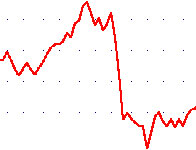|
|
||
|
Caveat Emptor: World Stock Markets |
 |
|
|
We live in a global financial community that is driven by the market place. That's no surprise. The old adage, "caveat emptor," or "let the buyer beware," has become more relevant today than ever before, despite a substantial increase in protective legislation and governmental regulatory watchdog agencies. Technology and consumer patterns have had a big impact, providing new ways to deliver messages to large numbers of people through written media, television, fax and the worldwide Internet. But the most important factor seems to be a change in attitudes. What was once considered questionable or even unethical behavior is now enthusiastically endorsed by many sellers and is now accepted as a way of life by the buyers of stocks. |
||
| Fraud, greed and unethical behavior--in some cases, even criminal actions--are prevalent in many of the world financial markets. Shoddy and shady auditing with insufficient oversight and transparency by greedy executive management has created havoc many times. As a result, millions of people have lost huge amounts of money in the past few years. The majority of individuals do not really understand what they are purchasing when they buy stocks from their broker. They receive a flood of information on various stocks and other investments from their financial planners and investment bankers. And from many of them, they receive recommendations to purchase particular stocks with the typical explanation that there is an expectation of significantly increased value and earnings for the shareholder of this particular stock. |
|
|
Why does any stock have a higher market value per share than the corporation's book value per share? Other than its dividend history and expectations of future dividends, there is no rational reason for the disparity in values, except in the case where a company is working on new, leading-edge technologies or break-through cures for diseases, research that has a potential to impact significantly the corporation's future sales and earnings. These types of investments are rare. |
||
Very little, if any, discussion takes place about how the market value of the stock was derived. Instead, potential shareholders are told about projections that may or may not happen, meaningless profit-earning ratios (P/E), and other data difficult to understand. In essence, the market value of some stocks is magically derived through a series of mumbo-jumbo calculations based on incomplete information. Once the market value of a particular stock is set forth, established, and accepted by the general public, many brokers and portfolio managers begin a united, sophisticated spin to sell the stock,with little or no real basis for the projected increase in its value. Thus, when any negative conditions arise, whether they are political or economic, the value of the stock often drops in value by 30-75% or more, and may not ever return to its previous high level of value. |
 |
|
Insiders, experts, option-holders, traders, and others who fully understand how this complex, opaque system works, are rewarded handsomely by shorting stocks and by using sophisticated techniques such as put, call, futures, derivations, margins, etc. The result is a great profit for a very small segment of the investing public (stakeholders). The majority of investors, however, represent the mid- to upper-level socioeconomic stratum; they are hard-working people who have placed much of their hard-earned, intended eventually for their children's education and their own retirement needs, into stocks, expecting that this money would ensure their future, only to discover that the bulk of the money has vanished in the volatility of the stock market. Buyers of stocks are stakeholders of the corporation whose stock they purchase, just like its customers. They, too, serve as a moral compass for the corporation. |
||
Stockbrokers and financial advisors need to disclose fully the exact nature of the risk versus the reward for each stock they recommend for purchase. Their advice should be based on objective data: accurate sales figures and projections, earnings, new products, quality of management, and solid justification for the premium of the market value per share. With all the publicity about corporations striving to be recognized as CSR (corporate socially responsible) businesses, they need to step forward and provide transparent information to the investing public, including both positive and negative early warning trends on aspects of their operations. At the present time, the overall market value of most stock markets is valued at a significant premium over the book value. Does this represent another bubble about to burst? Caveat emptor! |
|
|
(Originally posted 2005; reformatted February 2008) |
||
|
|
||
|
2000 © Hellenic Communication Service, L.L.C. All Rights Reserved.
http://www.HellenicComServe.com |
||

